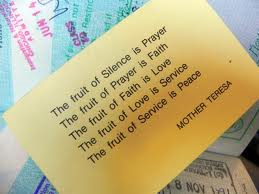 Mother Teresa's 'business card'
Mother Teresa's 'business card' Mother Teresa managed one of the world’s great international organizations, with offices in over 105 countries (she called them convents). Over the 55 years she ran her global aid agency (she called it a religious order), she met with many presidents and princesses, billionaires and fortune-500 CEOs. “But how will we get in contact with you, Mother?” they would ask. “Do you have a business card?” So Mother Teresa began printing a business card. It didn’t have a street address or email address or phone number but simply said: “Prayer is the fruit of silence. Faith is the fruit of prayer. Love is the fruit of faith. Service is the fruit of love. Peace is the fruit of service—Mother Teresa.” If you practice silence and prayer, you will receive faith and love, and you will want to serve others. That service will bring you great peace. It’s all one package. That was the kind of business Mother Teresa was in.
Owe nothing but love
Our two readings today speak of faith and love, the faith that makes true love possible. St. Paul tells us in Romans 13 to owe nothing to anyone but love. A good steward pays his bills on time, doesn’t rack up financial debt, and he doesn’t rack up emotional debt. He forgives injuries and misunderstandings quickly, so that the only currency he pays out is understanding love. All the other commandments, the Apostle says, are summed up in one: “You shall love your neighbor as yourself.” You can keep all the other commandments perfectly by simply practicing kindness and forgiveness to every other person.
Faith
But where does that love—that ability to be kind to people who are unkind to us, to forgive those who do not deserve forgiveness—from where does that currency come? It comes from faith. Mother Teresa pointed out that faith comes through prayer, and love comes through faith. No faith in God, no love for our fellow man. I can’t possibly forgive someone who tortured and killed my parents or my children (for example, a family I knew forced at gunpoint to watch as ISIS shot their sons to death). I can’t possibly forgive those people, and I can’t even forgive someone who lies or gossips about me at work, without God. He alone gives the capacity to forgive. So the apostles are in the boat, and it’s sinking. Jesus is asleep in the stern, and they yell at him: “don’t you care that we are dying?!” He gets up, rebukes the wind, and there was calm. “O you of little faith,” he says, and maybe with a little smile. “You are on your way to heaven, because I’m in your boat. But you have a long way to go towards fully trusting me. And so it is for us: we are in God’s house this Sunday morning, and we sing our faith in Him at every Mass. But the next time a storm blows up, or even a little wind shakes our boat, we panic. We complain: “Are you really there? Do you even care about me?!”
Stewardship
This weekend our parish had a little “stewardship retreat.” I gave a few talks on Friday night, and Kristi Marsella gave talks yesterday. She and her husband are old friends of mine, and I’ve watched their four children grow into fine young adults. She and her husband have been practicing Christian stewardship for 12 years, since they all became Catholic in 2005, and yesterday she spoke on the three acts of stewardship: praying, serving, and giving. First, a good steward of the mysteries of God (in St. Paul’s words) plans his prayer life, and prayer calms our fears. Have you noticed that people are a lot more insecure, negative, and doubtful these days? It’s because we, as a nation, are praying a lot less than we used to. Second, a good steward plans the service he renders to those who need help, and service casts out the sadness of selfish absorption. “One who serves the poor will never be sad in this life and never fear death,” said St. Vincent de Paul. And third, a good steward plans his sacrificial giving, both of money and time. Giving heals that greed that shrivels the heart of a man. The joy of knowing and serving Jesus was palpable by the end of our retreat yesterday. Why is stewardship fundamental to our Christian lives? Because we tend to be lazy in our faith, and lazy in our love. We generally don’t plan our prayer or our service or our giving, and so we don’t get around those spiritual acts much. This makes us sad, because only receiving and giving the graces of God bring us true joy. We have received everything we have and are, not to hoard it, but to give it away. That is the joy of the saints, the joy of living for and in God.


 RSS Feed
RSS Feed